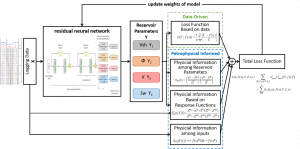Domain knowledge drives data-driven artificial intelligence in well logging
USA, March 20, 2024 /EINPresswire.com/ -- In well logging interpretation, researchers incorporate logging response functions that incorporate domain knowledge into the loss function of data-driven machine learning models, which are used to constrain model outputs. Under the influence of domain knowledge, model training is faster and the model outputs are in line with existing perceptions. The final manifestation is that the model has better robustness and accuracy when constrained by domain knowledge.
Data-driven artificial intelligence, such as deep learning and reinforcement learning, possess powerful data analysis capabilities. These techniques enable the statistical and probabilistic analysis of data, facilitating the mapping of relationships between inputs and outputs without reliance on predetermined physical assumptions. Central to the process of training data-driven models is the utilization of a loss function, which computes the disparity between the model's output and the desired target results (labels). The optimizer then adjusts the model's parameters based on the loss function to minimize the difference between the output and labels.
Meanwhile, geophysical logging involves a wealth of domain knowledge, mathematical models, and physical models. The reliance solely on data-driven models may sometimes yield outcomes that contradict established knowledge. Additionally, training data with uneven distribution and subjective labels can also impact the performance of data-driven models.
A recent study (https://doi.org/10.1016/j.aiig.2024.100070) published in the KeAi journal Artificial Intelligence in Geosciences reported the implementation of constraints on the training of data-driven machine learning models using logging response functions in well logging reservoir parameter prediction task.
"Our model, called Petrophysics Informed Neural Network (PINN), integrates petrophysics constraints into the loss function to guide training,” shares the study’s first author Rongbo Shao, a PhD candidate from China University of Petroleum-Beijing. “During model training, if the model output differs from petrophysics knowledge, the loss function is penalized by petrophysics constraints. This brings the output closer to the theoretical value and reduces the impact of labeling errors on model training.”
Additionally, this approach helps in discerning the correct relationships from training data, particularly when dealing with small sample sizes.
“We introduce allowable error and petrophysical constraint weights to make the influence of mechanism models in the machine learning model more flexible,” Shao elaborates. "We evaluated the PINN model's ability to predict reservoir parameters using measured data.”
Shao and her colleagues found that the model has improved accuracy and robustness compared to pure data-driven models. Nonetheless, the researchers noted that selecting petrophysical constraint weights and allowable error remains subjective, hence requiring further exploration.
Corresponding author Prof Lizhi Xiao of China University of Petroleum underscores the significance of this research, "Integrating data-driven AI models with knowledge-driven mechanism models is a promising research area. The PINN model is an exploration of geophysical logging in this direction."
Xiao emphasizes the need for continued refinement, "The selection of petrophysical constraint weights and allowable error, as well as the adaptability of domain knowledge to varying geological strata, present ongoing challenges. Additionally, the quality of datasets is crucial for the application of AI in geophysical logging. Comprehensive, publicly available well logging datasets with high quality and quantity are needed."
DOI
10.1016/j.aiig.2024.100070
Original Source URL
https://doi.org/10.1016/j.aiig.2024.100070
Funding information
This work was supported by National Key Research and Development Program(2019YFA0708301), the Strategic Cooperation Technology Projects of CNPC and CUPB (ZLZX2020-03), National Key Research and Development Program (2023YFF0714102), Science and Technology Innovation Fund of CNPC (2021DQ02-0403).
Lucy Wang
BioDesign Research
+ +86 177 0518 5080
email us here
Legal Disclaimer:
EIN Presswire provides this news content "as is" without warranty of any kind. We do not accept any responsibility or liability for the accuracy, content, images, videos, licenses, completeness, legality, or reliability of the information contained in this article. If you have any complaints or copyright issues related to this article, kindly contact the author above.

